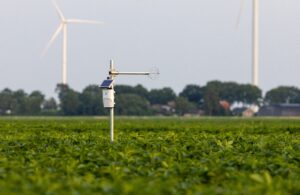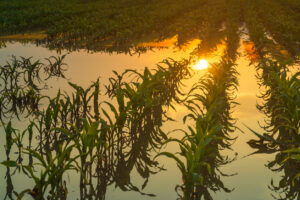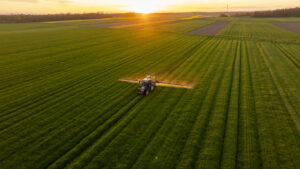CropX, an Israel-based farm management software platform provider, has acquired Dacom Farm Intelligence to expand into Europe.
This acquisition represents a major consolidation of agriculture digital twin capabilities, acres serviced, and geographic datasets. It also doubles CropX’s team and significantly increases its number of farms and total service area, with more than 20,000 new farms in over 50 countries.
The deal follows CropX acquisitions that include New Zealand-based Regen and Nebraska-based CropMetrics.
CropX’s suite of tools helps farmers monitor the movement of water and agrochemicals in the soil to minimize environmental pollution and prevent leaching, runoff, and unnecessary resource expenditures. It is still early days for what CropX estimates could grow into a $5 billion to $10 billion per year global opportunity. The company claims to be the only comprehensive farm management platform with active irrigation technology; self-calibrating moisture; and chemical sensors, soil data, fertilizer management, and crop protection capabilities.
“This industry is still early in the process of digital and precision transformation,” CropX CEO Tomer Tzach told VentureBeat. “Most farms still do not use data-driven precision farming practices, and only a tiny slice of the market uses them to their full potential.”
Tzach said he expects to see growing consolidation in the farm management industry and movement around agriculture-related APIs and data-sharing arrangements.
Each new acquisition also provides a deeper pool of data to draw on to improve the AI algorithms and recommendations in different regions. For example, what works well in Israel may be significantly different from what’s needed in rain-heavy regions like the Netherlands. Tzach expects to see considerably more consolidation and data-sharing agreements in the near future.
CropX is a leader in what AgFunder characterizes as the “farm management software and sensing market.” This area saw $879 million in investment last year, compared to $30.5 billion in total investment in the agtech market. Funding deals in farm management software and sensing in 2020 included XAG ($182 million), IXEYE ($87 million), DroneDeploy ($50 million), and Aclima ($40 million).
Meanwhile, agricultural giants have created farm management offerings that align with their various chemical and genetic portfolios. Monsanto acquired Climate Corp, which integrates satellite data into precision farming tools, and wove these into its Climate FieldView offering.
Monsanto was in turn acquired by Bayer, which had created Xarvio Field Manager. Meanwhile, competitor Syngenta bills its AgriEdge offering as “more than a whole-farm management program.” IBM has also rolled out IBM Agriculture, which connects to its IBM Watson AI platform.
Simplifying farm life
Tzach said the big motivation for the recent wave of mergers was a desire to simplify the user experience for farmers. One persistent challenge in agtech has to do with the gap between the sharp technological focus of many tech startups on the one hand and farmers’ desire for comprehensive farm management software solutions on the other hand.
“Farmers usually would rather not have to juggle 10 different apps, each one focusing on one type of farm optimization,” Tzach said.
CropX started with a pure focus on the precision irrigation space and went on to improve its tools for managing irrigation water on the farm using its own proprietary sensors, data, and AI. “We quickly learned from our customers that they would prefer to use our technology for more than water management, which started our journey into crop nutrition and other areas,” Tzach said.
He finds that it’s easy to underestimate how much customer understanding it takes to drive the adoption of new technologies in any specific region. The acquisition also helps when it comes to leveraging market expertise in each region.
This is the company’s third major acquisition in the last 18 months and the biggest — over 4 times the others in terms of new acres acquired. The Dacom acquisition added 2.7 million acres in Europe, compared to 500,000 acres in the U.S. with the 2019 CropMetrics acquisition and 170,000 new acres in New Zealand with the Regen acquisition.
Growing the ag digital twin
Agricultural digital twins combine data across multiple workflows to improve overall decision-making. This new acquisition helps the combined companies flesh out their technology stack. CropX claims this confers a competitive edge around connecting high granularity soil data with feedback from precision farming practices.
The acquisitions bring various kinds of technological capabilities to bear. CropX started with a focus on precision farming and optimizing water usage in Israel. CropMetrics focused on center pivot irrigation techniques and the U.S. Western Corn Belt. Regen focused on effluent management for the New Zealand dairy industry. Dacom provides tools to improve crop protection in Western Europe and optimize the use of pesticides and fertilizers.
Each acquisition has also brought better crop recording and tracking capabilities. These tools help manage a digital paper trail of everything that happens on the farm, from the type of crop planted to soil management and more. The data can also help prime AI models to improve farm performance over time or help farmers adapt to climate change.
Tzach said, “These are huge advantages to have together in one package for farmers wishing to document their regenerative and sustainable practices because they get all the certification and compliance paperwork that they need to prove that they are using best practices.”
Down the road, the company plans to create a carbon cycle report card that allows farmers to measure the carbon impact of different management practices and monetize carbon-sequestering practices. Idealized mathematical models of these things have been around in agriculture for a long time.
“What’s different now is that we are able to replace physics-based assumptions with data in a scalable way for the first time,” Tzach said.




